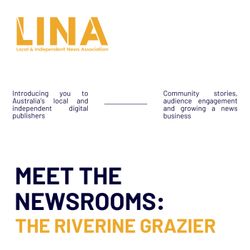Share

Meet the Newsrooms
The Westsider on the delicacy of reporting the housing crisis
Season 1, Ep. 1
•
Meet Barbara Heggen, editor of community newspaper The Westsider. Barbara shares the most heartwarming community projects happening in the multicultural suburbs of Melbourne's west. She explains the history of Techno Park Drive, an area that has been housing refugees and migrants since the 1950's, where residents are now facing mass eviction. Barbara also details some of the creative ways she generates sustainable revenue for the publication, including involving university students and professors, and engaging volunteers.
More episodes
View all episodes

5. About Time on reaching readers who are incarcerated
09:08||Season 2, Ep. 5Meet Joseph Friedman, one of the founders of About Time. In this episode, Joseph talks about what inspired him to start Australia's first prison newspaper. He details why stories about people being rehabilitated are important, considering how mainstream media has trouble humanising people in prison.
4. Manningham Life on translating to a LOTE
08:04||Season 2, Ep. 4Meet Stella Yee, Founder and Editor of Manningham Life. In this episode, Stella explains how print editions and translating her articles to Chinese keep the publication inclusive to everyone in her community. She outlines her most rewarding story about a massive freeway construction, and the toughest piece of work - a council election guide.
3. Fitzmedia on advertising IRL
07:21||Season 2, Ep. 3Meet Liam Fitzgerald, Founder and Director at Fitzmedia. In this episode, Liam explains why he decided to launch a live TV news station completely online. Then, he talks about the role local media plays in preserving the history of the area, in particular a story he did on Warrnambool's old textiles factory. Finally, Liam explains why reporting on road fatalities is so hard as a local journalist, and also about the new Mercato advertising screens Fitzmedia has been using.
2. Brunswick Voice on the credibility of print
08:26||Season 2, Ep. 2Meet Mark Phillips, Editor of Brunswick Voice. In this episode, Mark talks about why he launched this newspaper in 2021 after the local outlets had shut down. Then, he shares how the paper supported community fundraising to keep a local artist's collective going, and also covered tough story about a recent arrest. Finally, Mark talks about the credibility of print newspapers and how to keep dialogue open between a newspaper and it's community.
1. The Conversation on hosting open editorial meetings
10:28||Season 2, Ep. 1Meet Misha Ketchell, editor of The Conversation. In this episode, Misha talks about The Conversation's emergency reporting including providing maps of the recent flooding in NSW. He also explains some of the tougher stories for him to navigate as an editor. Finally, Misha shares The Conversation's way of keeping an open dialogue with its readership through publishing feedback and running open editorial meetings.
8. The Riverine Grazier on engaging young readers
06:04||Season 1, Ep. 8Meet Tertia Butcher, editor of The Riverine Grazier since 1995. In this episode, Tertia explains the logistics and logic behind her 'Editor for 60 minutes' initiative, inviting young students into her office. She also talks about her favourite investigative piece on a school bus crash in the area, and the difficulties of reporting on council scandals.
7. Western Weekender on interacting with locals
08:29||Season 1, Ep. 7Meet Troy Dodds, the managing editor of Western Weekender. He tells us about how the paper stays in touch with the locals of Penrith through a text line, involvement in local events and keeping the office doors open for anyone to walk in. We also talk about navigating council or sports controversies when you know the people involved in the scandal.
6. Newsport on accurately reflecting local community
07:57||Season 1, Ep. 6Meet Sam Cullen, the managing director of Newsport, covering news and community in Far North Queensland's Douglas shire. In this episode, Sam tells us why hyperlocal journalists are the most trustworthy. He also explains the difficulties of crocodile reporting, perhaps one of the more niche issues this paper has to deal with. Finally, he talks about Newsport's successful real estate and job listings directories.
5. SE Voice on writing stories that hit close to home
08:05||Season 1, Ep. 5Meet Lechelle Earl, the editor of SE Voice. In this episode, we talk about the viral moment a local footy player was drafted into the AFL — and how important it is for local news outlets to be the ones covering those stories. Being embedded in the community can also be tough, as Lechelle opens up about covering a story close to her heart.